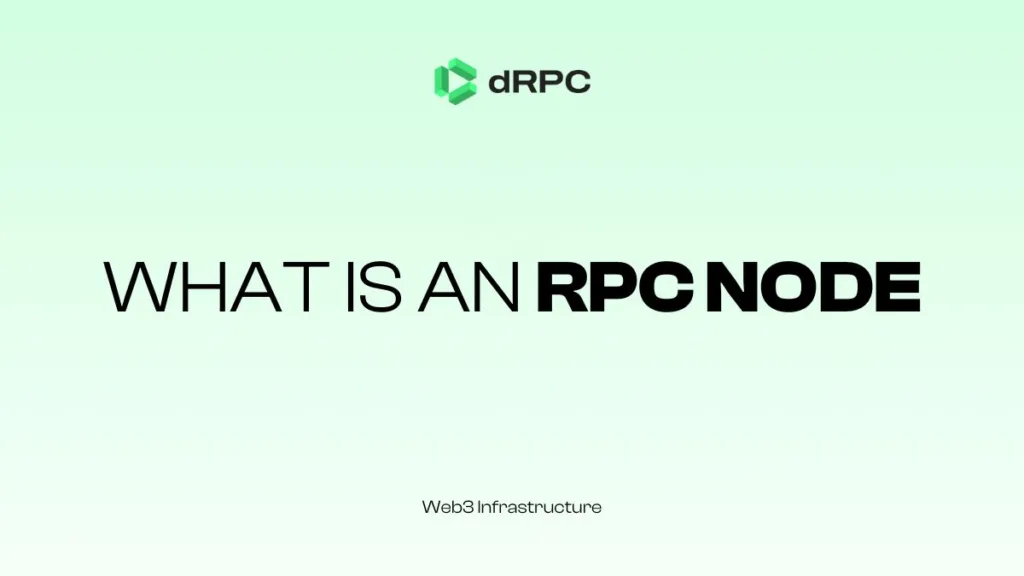What are RPC nodes? RPC nodes are the bridge between your application and blockchain networks. They translate your requests into blockchain-readable commands and return the data you need, enabling every interaction from checking wallet balances to executing smart contracts.
So, every time you send a transaction, query blockchain data, or interact with a dApp, an RPC node processes that request. Without RPC nodes, applications cannot communicate with decentralized networks making them critical infrastructure for the entire Web3 ecosystem.
🧠 True or False: Without an RPC node, a dApp can still submit transactions directly to the blockchain network.
Show Answer
❌ False.
RPC nodes act as the intermediary that translates and relays transaction data.
Without them, the application has no way to communicate with or broadcast transactions to the decentralized network.
RPC Node Component Overview
| Component | Function | Performance Impact |
|---|---|---|
| JSON-RPC Interface | Standardized communication protocol | Determines request/response efficiency |
| Node Client | Maintains blockchain state synchronization | Affects data accuracy and latency |
| API Endpoints | Expose blockchain functionality to applications | Controls accessibility and rate limits |
| Load Balancer | Distributes requests across multiple nodes | Ensures reliability and optimal response times |
| Data Cache | Stores frequently requested information | Reduces latency for common queries |
This guide covers how RPC nodes work, their types, implementation strategies, and why choosing the right provider significantly impacts your application’s performance and reliability.
How RPC Nodes Enable Blockchain Communication
RPC (Remote Procedure Call) nodes serve as intermediaries that convert application requests into blockchain-compatible format. When your application needs to read transaction data, check account balances, or submit transactions, the RPC node handles the technical communication with the blockchain network.
Core Functions:
- Data Retrieval: Query blocks, transactions, and account states
- Transaction Submission: Broadcast signed transactions to the network
- Smart Contract Interaction: Execute contract calls and retrieve results
- Network Monitoring: Track blockchain state changes and events
The process works through standardized JSON-RPC protocols. Your application sends a formatted request to an RPC endpoint, which processes the request against the blockchain and returns structured data. This abstraction layer eliminates the need to run full blockchain nodes while maintaining direct access to network data.
🧠 Quick Quizz: Which protocol do most RPC nodes use for communication?
- A. HTTP/REST
- B. JSON-RPC
- C. GraphQL
- D. WebSocket only
Show Answer
✅ B. JSON-RPC — JSON-RPC is the standard protocol, though many providers also support additional protocols for enhanced functionality.
Types of RPC Node Infrastructure
Public RPC Nodes
Public RPC endpoints provide free access to blockchain data through shared infrastructure. These nodes handle requests from multiple applications simultaneously, making them suitable for development and testing phases.
Characteristics:
- Shared rate limits across all users
- No authentication required
- Variable performance during peak usage
- Limited customization options
Public nodes work well for initial development but often struggle with production demands due to rate limiting and reliability constraints.
Private RPC Nodes
Private nodes offer dedicated infrastructure for specific applications or organizations. They provide consistent performance, custom rate limits, and enhanced security through isolated network access.
Advantages:
- Dedicated bandwidth and processing power
- Custom rate limiting and caching strategies
- Enhanced security through private network access
- Configurable monitoring and alerting
Setting up private nodes requires significant technical expertise and ongoing maintenance, including hardware management, software updates, and security monitoring.
Managed RPC Providers
Professional RPC providers combine the benefits of private infrastructure with managed services. They offer enterprise-grade performance without the operational overhead of self-hosted solutions.
Provider Benefits:
- Reliability: 99.9%+ uptime with redundant infrastructure
- Performance: Optimized routing and caching for sub-100ms response times
- Scalability: Automatic scaling based on request volume
- Support: Technical assistance and performance optimization
RPC Node Performance Factors
Latency Optimization
Response time directly impacts user experience in Web3 applications. High-performance RPC providers use several techniques to minimize latency:
- Geographic Distribution: Nodes positioned near major user populations
- Intelligent Load Balancing: AI-driven request routing to optimal endpoints
- Data Caching: Frequently requested data stored at edge locations
- Connection Pooling: Persistent connections to reduce handshake overhead
Reliability Mechanisms
Enterprise applications require consistent RPC access. Robust providers implement multiple reliability layers:
- Multi-Region Redundancy: Automatic failover between geographic regions
- Health Monitoring: Real-time node status tracking and automatic replacement
- Cross-Verification: Multiple nodes validate responses for accuracy
- Circuit Breakers: Prevent cascade failures during high-load periods
Implementation Strategies
Development Phase
During development, teams typically start with public RPC endpoints for prototyping and testing. This approach allows rapid iteration without infrastructure concerns.
Development Best Practices:
- Use public endpoints for initial testing
- Implement request retry logic with exponential backoff
- Monitor API rate limits and adjust request patterns
- Test with multiple blockchain networks early
Production Deployment
Production applications require dedicated RPC infrastructure to ensure reliable performance. Key considerations include:
Infrastructure Requirements:
- Dedicated rate limits matching peak usage patterns
- Sub-second response times for critical operations
- 24/7 monitoring and alerting capabilities
- Compliance with security and data protection standards
Scaling Considerations
As applications grow, RPC infrastructure must scale accordingly. Professional providers offer automatic scaling based on usage patterns, eliminating the need for manual capacity planning.
Choosing RPC Infrastructure
Self-Hosted vs. Managed Solutions
Self-Hosted Nodes:
- Complete control over configuration and security
- Significant setup and maintenance overhead
- Requires blockchain expertise and DevOps resources
- Full responsibility for uptime and performance
Managed Providers:
- Professional infrastructure with SLA guarantees
- Immediate access without technical setup
- Ongoing support and performance optimization
- Predictable pricing based on usage
Evaluation Criteria
When selecting RPC infrastructure, consider these technical factors:
Performance Metrics:
- Average response time under normal load
- 99th percentile latency during peak usage
- Uptime statistics over extended periods
- Geographic coverage and edge node availability
Technical Capabilities:
- Supported blockchain networks and protocols
- WebSocket support for real-time data
- Archive node access for historical queries
- Custom endpoint configuration options
dRPC: Enterprise-Grade RPC Infrastructure
dRPC provides high-performance RPC access across 95+ blockchains with enterprise-grade reliability. Our infrastructure combines AI-driven load balancing with global edge distribution to deliver consistent sub-100ms response times.
Key Advantages:
- Cross-Chain Support: Access to major blockchain networks through unified APIs
- Performance Optimization: AI load balancer routes requests to optimal endpoints
- Reliability: 99.9% uptime with automatic failover across 160+ networks
- Developer Experience: Simple integration with comprehensive documentation
Getting Started with dRPC
Setup Process:
- Create your dRPC account
- Generate API credentials from the dashboard
- Select your blockchain network
- Configure endpoints in your application
- Monitor usage and performance through analytics dashboard
Integration Example:
// Configure dRPC endpoint
const rpcUrl = 'https://your-endpoint.drpc.org';
const web3 = new Web3(rpcUrl);
// Query blockchain data
const balance = await web3.eth.getBalance(address);
const blockNumber = await web3.eth.getBlockNumber();Our platform provides detailed analytics, allowing you to monitor request patterns, optimize performance, and scale infrastructure based on actual usage data.
Performance Results: Teams using dRPC typically achieve 3x cost savings compared to self-hosted solutions while maintaining enterprise-grade reliability. Our global infrastructure ensures consistent performance regardless of user location or network conditions.
Conclusion
RPC nodes form the critical infrastructure layer that enables all Web3 application functionality. While public nodes serve development needs, production applications require dedicated infrastructure with predictable performance and reliability.
Professional RPC providers like dRPC eliminate the technical complexity and operational overhead of self-hosted solutions while delivering superior performance through optimized global infrastructure. This allows development teams to focus on building innovative applications rather than managing blockchain infrastructure.
The choice between self-hosted and managed RPC solutions ultimately depends on your team’s technical resources, performance requirements, and scalability needs. For most production applications, managed providers offer the optimal balance of performance, reliability, and cost-effectiveness.
Ready to optimize your RPC infrastructure? Explore dRPC’s high-performance endpoints and experience the difference professional blockchain infrastructure makes for your applications.


